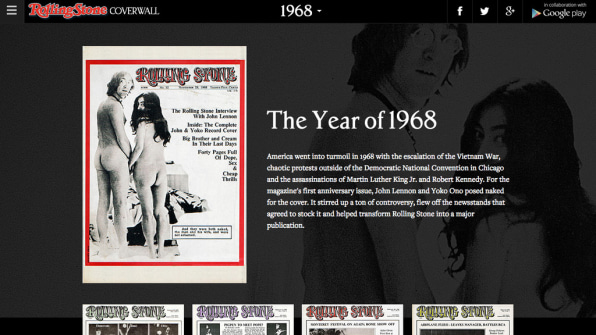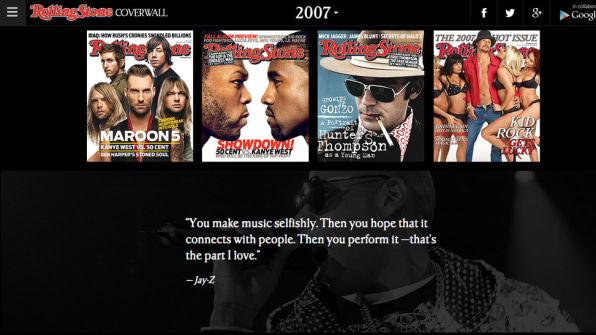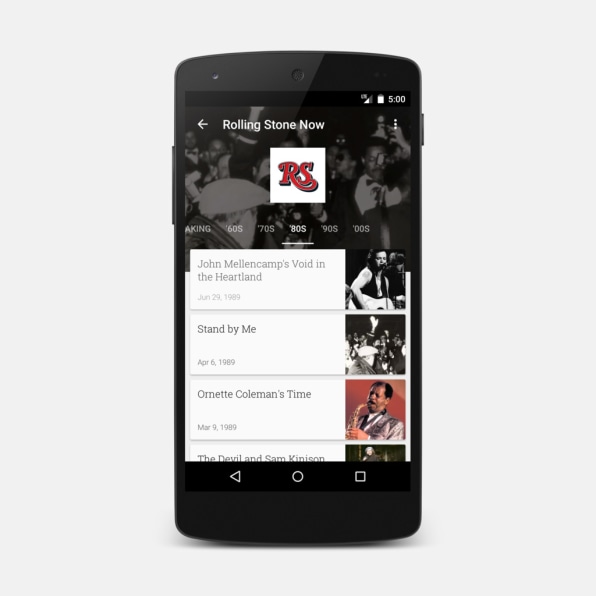How to Play Winter by the Rolling Stones
When Robin Williams died last year, mourning fans turned to the web–and Rolling Stone was ready for them.
"It was an incredibly sad moment, but the next day we promoted three cover stories about Robin Williams and the traffic was enormous," says Gus Wenner, son of Rolling Stone founder Jann Wenner and the head of digital for Wenner Media. "People wanted to read these portraits, and the quality was there, the writing was there."
For Wenner, that outpouring of interest affirmed an idea that he had been mulling over for months, inspired by a "cover wall" in the magazine's midtown Manhattan offices. "You're walking down a ledger of pop culture," he says, from John Lennon and Yoko Ono in 1968 to Kid Rock and a bevy of bikini-clad women in 2007. "It's powerful."

Now Wenner will finally have the digital platform for showcasing that history, thanks to a collaboration with Google that will bring the archives into the Google Play Newsstand, starting this Friday. "I see it every day in our analytics: Archival content performs very well. It comes down to how you promote and when," he says. "We'll be smart about how we promote it, and we'll tie it to news events. It's not hard to find these moments."
At the start, three to four major stories from each archive issue will be available for free through Google Play and on the Rolling Stone website, which Wenner says is on track to score 24 million unique visitors this month. Next year he hopes to enhance the archive stories with multimedia content, including sound and video.

The collaboration comes at a time when publishers are waking up to the dominance of Google's Android operating system and are warily eyeing Facebook's tightening control over content distribution. Smartphone customers with Android devices now represent more than 80% of the market, thanks to tricked-out phones selling at affordable price points, and their spending on games, music, and other media through Google Play is steadily catching up with that of iOS App Store and iTunes customers. Using Google's payouts to developers as a proxy suggests that Google Play revenue has been more than doubling each year.
As for Facebook, the social network's shifting news feed policies have provoked ire in the media world, as publishers scramble to turn Facebook fans into unique visitors. Facebook's latest video-player update prompted John Herman to sound this warning in The Awl: "Facebook is more interested in hosting the things media companies make than just spreading them, that it views links to outside pages as a problem to be solved," he wrote.

Google, which bought seven figures' worth of Rolling Stone advertising as part of the deal, is attempting to strike a friendlier chord. "Our goal is to help publishers succeed in a changing world," says Brian Irving, global head of marketing for Google Play. "We're constantly looking for ways to partner with people who are content creators and help bring something to life."
Irving says he views the Rolling Stone partnership as a way to demonstrate the possibilities of Google Play's Newsstand, which he argues is better suited for content discovery than Apple's Newsstand, due to features like customizable themes and key word searches. Whether Android users agree remains to be seen: They currently over-index on search, email, games, and TV, and under-index on general news, according to ComScore data on share of time from June 2014.
Rolling Stone's online Cover Wall and Google Play app launch this Friday.
How to Play Winter by the Rolling Stones
Source: https://www.fastcompany.com/3041581/rolling-stone-teams-up-with-google-play-to-monetize-its-archives
0 Response to "How to Play Winter by the Rolling Stones"
Post a Comment